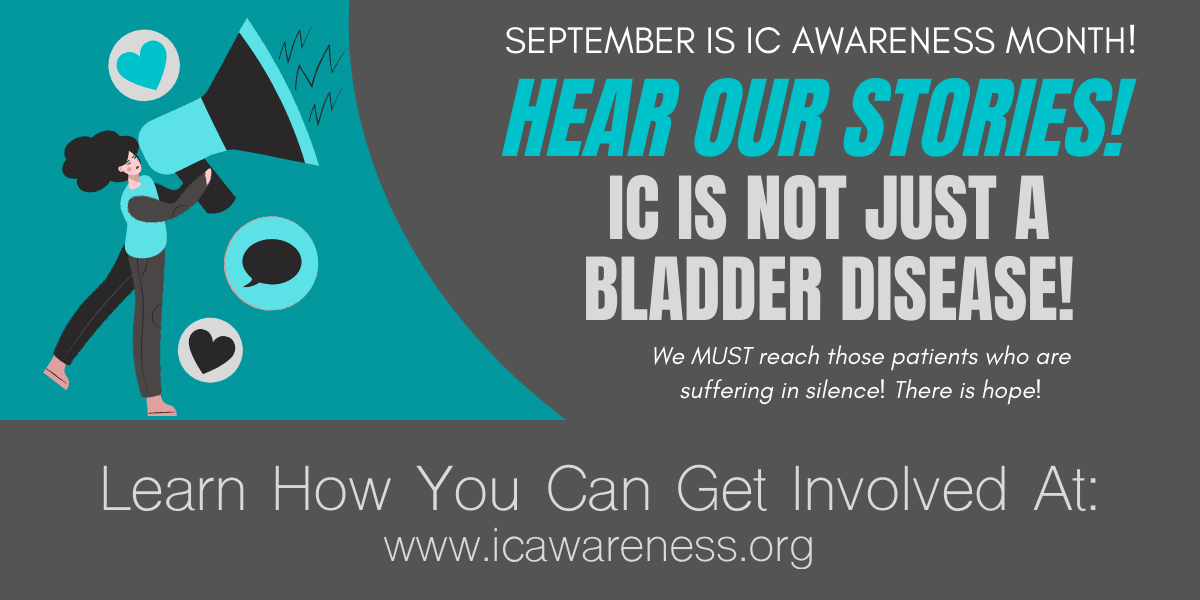IC Awareness Month begins this week and we always start with a press release that YOU can share and send to your local newspaper and media outlets to help us raise awareness for this condition. As we have been anticipating for the past few years, the new AUA Guidelines no longer consider IC a bladder disease but rather a pelvic pain syndrome. This helps us understand why so many patients simply did NOT improve with bladder therapies. The goal is to find the right treatment for your specific case by correctly identifying the underlying cause. If your symptoms began as you got older, could it be estrogen atrophy? Did they start after a fall or having a baby? That could be pelvic floor muscle dysfunction and/or injury. Rather than chasing the symptoms with treatments, our focus in 2023 is to look closer at the patient with phenotyping and make a individualized, customized treatment plan. Please help us by sharing this news across all of your social networking platforms!
Official Press Release
Click here to download the official press release to share with others!
IC Awareness Month – September 2023 – icawareness.org
Estrogen Loss Often Missed Cause of IC/BPS & Urinary Symptoms
FOR IMMEDIATE RELEASE
September 1, 2023
(Santa Rosa, CA) Imagine being told that you have an incurable disease that will leave you in severe pain, unable to work, sleep, enjoy intimacy, unable to eat or drink your favorite foods and leave you virtually tied to a restroom for the rest of your life. Yet, for millions of women, there is no disease and the condition is treatable.
“Many women have been told that they have an incurable bladder disease (interstitial cystitis and/or bladder pain syndrome) when their symptoms are actually the result of estrogen loss” offered Jill Osborne, founder of the Interstitial Cystitis Network. “Known as Genitourinary Syndrome of Menopause (GSM) or VulvoVaginal Atrophy (VVA), their symptoms of urinary frequency, urgency, burning, pain and recurring UTI often begin after total hysterectomy, the use of medications which suppress estrogen or simply with aging.(1)”
Estrogen loss is often the root cause for women whose urinary symptoms begin as they age. One study of 2000 women in Britain found that 50% of women between the ages of 55 and 85 years of age experienced urogenital symptoms, some quite seriously.(2) An estimated 20% of women between the ages of 40 and 45 years of age also struggled with symptoms.(3)
“As estrogen levels decline, changes occur in the urethra, bladder, vaginal vestibule and labia resulting in a dramatic reduction in skin health and quality. This, in turn, makes the skin more vulnerable to chemical irritation and infection” offered Ms. Osborne.
Young women using birth control might also find themselves urinating more frequently due to the suppression of estrogen. One 18 year old developed urinary symptoms two weeks after starting birth control pills that resolved once she stopped them. (4)
“In 2023, our goal is to help IC/BPS patients differentiate between cause and effect. Rather than chasing the symptoms with medications, we want to identify the underlying cause so that the most effective treatments can be utilized,” offered Ms. Osborne.
She continued “For the GSM patient, the primary focus should be on improving the quality and health of the skin, usually with topical estrogen cream. Sadly, some patients don’t consider using estrogen therapy because of misinformation about its safety.(5) Some prematurely stop using estrogen when their urinary symptoms don’t immediately improve. Estrogen therapy takes time.”
Physicians are now utilizing phenotyping to provide a more individualized diagnostic workup.(6) For example, pelvic floor dysfunction is found in an estimated 85% of men and women struggling with IC/BPS.The American Urology Association Guidelines for IC/BPS suggests that any patient with tight muscles be referred immediately to physical therapy.(7,8)
September 1st launches the annual IC Awareness Month campaign. We want patients and providers to step back and reconsider the diagnosis of IC/BPS in patients not responding to treatment. Was GSM, PFD or another condition missed that could be treated?
Learn more about IC Awareness Month at: www.icawareness.org
Contact:
Jill H. Osborne MA
Interstitial Cystitis Network
707-538-9442
icnetwork@mac.com
References:
- Menopause | NICHD – Eunice Kennedy Shriver National Institute of Child Health and Human Development.
- Sarmento A, et al. Genitourinary Syndrome of Menopause: Epidemiology, Physiopathology, Clinical Manifestation and Daignostic. Front Reprod Health. 2021;3
- Barlow DH, et al.. Urogenital ageing and its effect on sexual health in older British women. Br J Obstet Gynaecol. (1997) 104:87–91.
- Nappi RE, et al. Impact of vulvovaginal atrophy of menopause: prevalence and symptoms in Italian women according to the EVES study. Gynecol Endocrinol. (2019) 35:453–9.
- Dominus S. Women Have Been Misled About Menopause. NY Times. February 1, 2023.
- Osborne J. Could birth control pills cause IC in some patients? Possibly!” IC Network. July 17, 2020
- Osborne J. IC Subtypes & Phenotypes. Interstitial Cystitis Network. January 31, 2023.
- Clemens JQ, et al: Diagnosis and treatment of interstitial cystitis/bladder pain syndrome. J Urol 2022. Jul;208(1):34-42
- Fitzgerald MP, et al. Randomized multicenter clinical trial of myofascial physical therapy in women with IC/BPS and pelvic floor tenderness. J Urol 2012 Jun;187(6):2113-8

